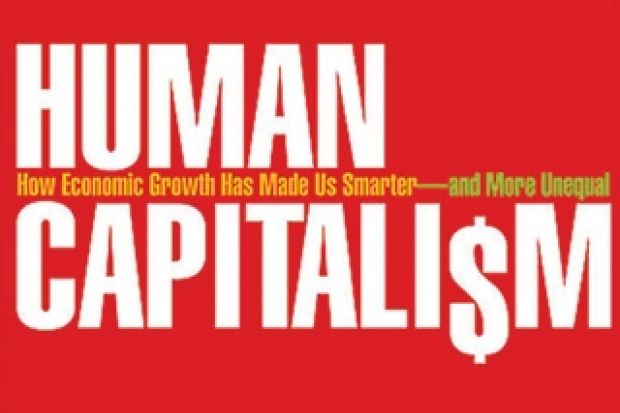On page 35 of Brink Lindsey’s Human Capitalism I found a sentence I agreed with: “The surest way to becoming an educated high-performing member of the socio-economic elite is to pick the right parents.” The feeling didn’t last long. Lindsey and I disagree fundamentally on the reasons why social mobility is so limited and on what we ought to do about it. (We also disagree about most of human history, which is covered at slapdash speed in the first two chapters. I wonder what Aristotle would have made of Lindsey’s claim that before the current “age of complexity” - which at certain points seems to mean before the Industrial Revolution and at others before the internet - abstract thinking skills were unnecessary and therefore non-existent.) Reading books with which one disagrees is something we should all do regularly, but this slim volume is too broad- brush in its arguments and too casual in its use of evidence to challenge anyone’s thinking. If it doesn’t confirm to you what you think you already know, you will soon be throwing it at the wall in exasperation.
In essence, Lindsey’s argument is that inequality in the US today is driven by education, education, education - and that only certain children, from certain families, are in a position to gain the type of education needed to survive in today’s complex world of information overload. “Working-class” families (and African American families, and Hispanics) simply have the wrong cultural attitudes. High-school success is frowned on in poorer neighbourhoods, while single parents lack the resources (and step-parents the motivation) to invest properly in bringing up their children.
The solution? To make sure the working class imbibes the solid virtues of a strong work ethic, commitment to family life and the joys of abstract thinking. How can this be done? By providing strong tax incentives to economic growth along with incentives to work (for example, by reforms to disability benefits); introducing more competition between state schools; and (I kid you not) reducing government subsidies to higher education because that would challenge the current lazy universities and colleges and offer an incentive to entrepreneurs to come forward with new innovative ways of providing education.
The potential position of left-wing critics (of which I count myself one) is set up and knocked down in straw-man fashion. Apparently, in our view, the problem would be solved by giving poorer families more money - and this, Lindsey says, has been found not really to matter by the University of Chicago public-policy scholar Susan Mayer. My own recent systematic review of the evidence in this area suggests that money does make a difference to a wide range of outcomes for children. But let’s set that aside. Nobody would argue that parental characteristics are irrelevant.
The more important point is that structural inequalities in society are entirely ignored in this book. The main reason for poverty is not culture but low pay, and the reason that many people are paid poorly is not that they are incapable of abstract thought but that there are low-skilled jobs (and skilled but low-valued jobs) that need doing and weak unionisation allows companies (and governments) to pay people peanuts to do them. These jobs keep our world moving - our offices clean, our transport services running, our tiny children and elderly relatives cared for.
Individually, for some people, the route out is to get a degree - although as the ranks of graduates increase, a second degree plus unpaid work experience is becoming the new entry requirement for many professions and the middle-class stranglehold continues. But this isn’t a solution for society as a whole. Not everyone can be a hedge fund manager, so educating the cleaners in hedge fund skills will not solve the problem of entrenched inequality. A more promising solution is to share the proceeds of growth more fairly.
Human Capitalism: How Economic Growth Has Made Us Smarter - and More Unequal
By Brink Lindsey
Princeton University Press, 144pp, £10.95
ISBN 9780691157320
Published 22 May 2013
Register to continue
Why register?
- Registration is free and only takes a moment
- Once registered, you can read 3 articles a month
- Sign up for our newsletter
Subscribe
Or subscribe for unlimited access to:
- Unlimited access to news, views, insights & reviews
- Digital editions
- Digital access to THE’s university and college rankings analysis
Already registered or a current subscriber?




